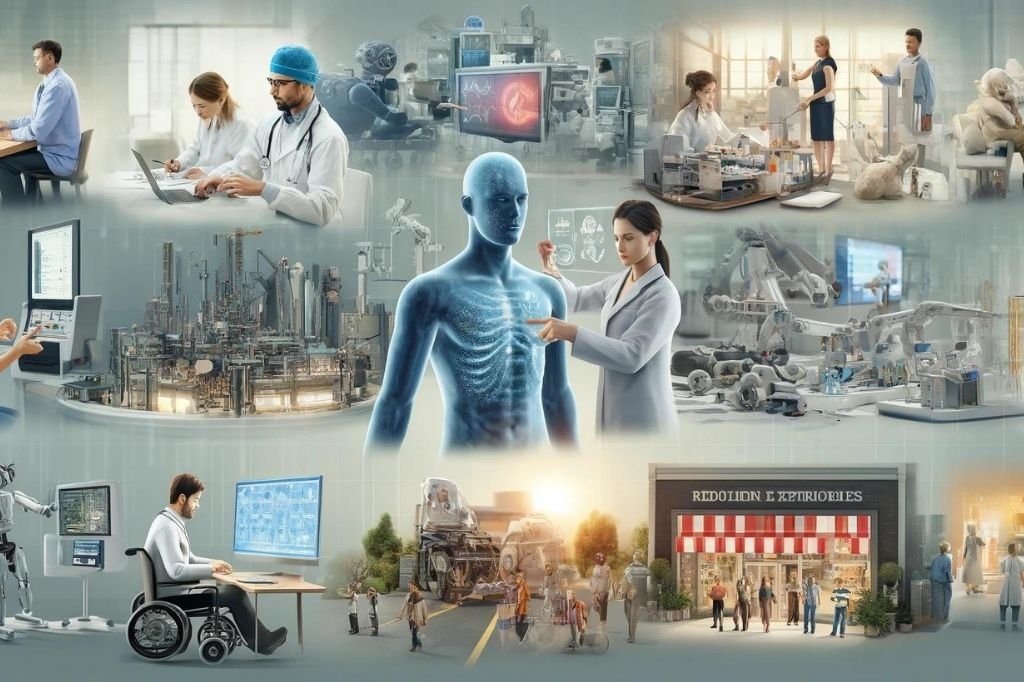In the rapidly evolving landscape of technology, one question has been on the minds of innovators and business leaders alike: which industry is likely to benefit most from generative AI? The potential of generative AI is vast, and its applications are reshaping various sectors, from healthcare to entertainment. Understanding where this transformative technology can make the most significant impact is crucial for staying ahead in today’s competitive market.
Healthcare: Revolutionizing Diagnosis and Treatment
The healthcare industry stands at the forefront of benefiting from generative AI. With the advent of advanced algorithms, AI can analyze vast amounts of medical data, identifying patterns and correlations that human eyes might miss. This capability is especially valuable in diagnosing diseases at an early stage, where traditional methods might fail.
Generative AI’s ability to create detailed models of patient data means it can predict disease progression and suggest personalized treatment plans. For instance, AI-driven platforms can generate synthetic medical images to train models, improving the accuracy of radiology and pathology. Moreover, AI can simulate potential outcomes of various treatments, helping doctors make more informed decisions.
In drug discovery, generative AI accelerates the development process by predicting molecular structures that could effectively target specific diseases. This not only speeds up the time-to-market for new medications but also significantly reduces research and development costs. The implications of these advancements are profound, potentially leading to higher survival rates and improved quality of life for patients worldwide.
Entertainment: Crafting Unique and Immersive Experiences
The entertainment industry is another sector poised to reap substantial rewards from generative AI. From movies to video games, AI is transforming how content is created and consumed. One of the most notable applications is in the realm of virtual characters and environments.
Generative AI can design highly realistic characters and settings, providing a more immersive experience for audiences. In film production, AI algorithms can generate entire scenes or special effects, saving time and resources while maintaining high-quality standards. Similarly, in gaming, AI can create dynamic and adaptive worlds that respond to player actions, offering a personalized and engaging experience.
Moreover, generative AI is revolutionizing music and art creation. AI can compose music that adapts to different moods and scenarios, enhancing the emotional impact of a scene. In art, AI-generated works are gaining popularity, with some pieces even being sold at prestigious auctions. These innovations are pushing the boundaries of creativity and redefining what is possible in the entertainment industry.
Finance: Enhancing Decision-Making and Risk Management
The finance industry is inherently data-driven, making it a prime candidate for generative AI applications. AI can analyze complex financial data sets, uncovering insights that inform better decision-making and improve risk management. One of the key benefits is in predictive analytics, where AI models forecast market trends and investment opportunities with greater accuracy than traditional methods.
Generative AI also enhances fraud detection by identifying unusual patterns and behaviors that may indicate fraudulent activity. By continuously learning from new data, AI systems can adapt to evolving threats and provide more robust security measures. This proactive approach not only protects financial institutions but also builds trust with customers.
Additionally, generative AI can automate routine tasks such as portfolio management and customer service. AI-driven chatbots provide instant support and personalized financial advice, improving customer satisfaction and operational efficiency. These advancements are transforming the finance industry, making it more agile and responsive to changing market dynamics.
Manufacturing: Optimizing Production and Supply Chains
The manufacturing sector is leveraging generative AI to optimize production processes and enhance supply chain management. AI algorithms can design more efficient production lines by simulating various scenarios and identifying the best configurations. This leads to increased productivity and reduced operational costs.
Generative AI also plays a critical role in predictive maintenance. By analyzing data from sensors embedded in machinery, AI can predict when a component is likely to fail and schedule maintenance before a breakdown occurs. This proactive approach minimizes downtime and extends the lifespan of equipment.
In supply chain management, generative AI improves demand forecasting and inventory management. AI models can predict demand fluctuations more accurately, helping manufacturers maintain optimal inventory levels and reduce waste. This not only enhances efficiency but also supports sustainability efforts by minimizing excess production and resource consumption.
Retail: Personalizing the Shopping Experience
In the retail industry, generative AI is enhancing the shopping experience by offering personalized recommendations and improving customer engagement. AI algorithms analyze customer data to understand preferences and predict future behavior. This allows retailers to tailor their offerings to individual customers, increasing satisfaction and loyalty.
Generative AI also streamlines inventory management by predicting which products will be in demand and ensuring they are stocked appropriately. This reduces the risk of overstocking or stockouts, optimizing inventory turnover and profitability. Additionally, AI-powered chatbots provide personalized assistance, answering customer queries and guiding them through their shopping journey.
In e-commerce, generative AI enhances product search and discovery by creating detailed and relevant product descriptions and images. This improves the overall user experience and increases conversion rates. By leveraging generative AI, retailers can stay competitive in a rapidly changing market and deliver exceptional value to their customers.
Conclusion
The potential of generative AI is boundless, and its impact spans across various industries. From healthcare to retail, AI is transforming how we diagnose diseases, create entertainment, manage finances, optimize manufacturing, and enhance shopping experiences. As we continue to explore and harness the power of generative AI, it becomes increasingly clear that this technology will be a driving force in shaping the future of numerous sectors.
Understanding which industry is likely to benefit most from generative AI is not just about identifying where the technology can make a difference; it’s about envisioning a future where AI drives innovation and growth, improving lives and creating new opportunities. The journey has just begun, and the possibilities are endless.
